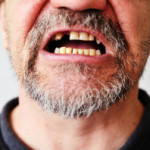Good oral hygiene can really help you to improve your dental health, preventing cavities, reducing your risk of gum disease and generally ensuring that your next trip to the dentist is a more pleasant one. Here are three tips to help you improve your oral hygiene.
1. Replace your toothbrush often
Many people forget to replace their toothbrush on a regular basis. Your toothbrush should be firm enough to clean your teeth well. If the bristles are frayed, splayed or damaged then the toothbrush is not doing its job properly. Old and worn toothbrushes are also more likely to harbor bacteria, which means that they could be increasing your risk of infections. Rinse your toothbrush when you are finished with using it, and store it properly.
2. Take your time when brushing
Try to take your time when you are brushing your teeth. Make sure that you brush all of your teeth, and brush the top, front, and back of each tooth. After you have thoroughly brushed your teeth, take a moment to floss and use a good mouth-rinse. Flossing is particularly important because it cleans the areas of your mouth that your toothbrush cannot reach. Many people omit flossing and rush the process of brushing their teeth and this puts them at risk of tooth decay. They are then confused when they have dental problems, because they believe that they have been taking good care of their teeth.
3. Snack before brushing your teeth
There is nothing wrong with eating sweets, cakes or biscuits from time to time. In fact, if you deprive yourself of those things then you are more likely to end up binge-eating them later on, giving up on your healthy eating habits. Instead of depriving yourself, try to limit when you snack. If you have a bag of candy, eat a portion in one sitting then put it away – this will do less harm to your teeth than snacking constantly on the candy throughout the day. If you are going to eat a cake, brush your teeth afterwards. This will limit the impact of taking in all that sugar.
These simple changes to your dental care regimen will do a lot to protect your oral health, and will help to ensure that next time you go to the dentists you are less likely to need a filling or other procedure.

 A tooth can be knocked out when something strikes your face by accident. It can happen when you are playing sports, when you slip and fall, or when someone accidentally hits your mouth area at home or at work. Accidents can happen at any time. When your tooth is knocked out, it is important that you see us immediately so that we can save your tooth and replant it back into place.
A tooth can be knocked out when something strikes your face by accident. It can happen when you are playing sports, when you slip and fall, or when someone accidentally hits your mouth area at home or at work. Accidents can happen at any time. When your tooth is knocked out, it is important that you see us immediately so that we can save your tooth and replant it back into place.